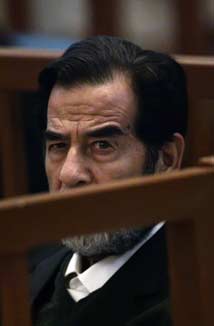|
Saddam may receive verdict on November 5
(Reuters)
Updated: 2006-10-17 11:40

Saddam Hussein listens
to a witness testimony during his trial in Baghdad's heavily fortified
Green Zone October 9, 2006.
[Reuters] | Bagdad - An Iraqi court trying Saddam Hussein for the killing of Shi'ite
villagers in the 1980s could deliver a verdict on November 5, officials said, a
ruling which could send the ousted leader to the gallows.
The US-backed
court was due to announce on Monday a final date for verdicts on Saddam and
seven of his former top lieutenants for crimes against humanity, a charge which
carries a maximum penalty of death by hanging.
But the court said it
needed more time to review testimony. Chief prosecutor Jaafar al-Moussawi said
the Iraqi High Tribunal could announce a verdict when it reconvenes on November
5.
"Right now they are checking some testimonies and details. If they
finish by then, then they will definitely announce the verdict on November 5,"
he said.
Court spokesman Raed Juhi was more cautious on setting a date
for the ruling of a case which opened a year ago and has been marred by repeated
delays and interruptions.
"If the court has finished reviewing testimony by
November 5 there might be a verdict. The court would do whatever it finds
appropriate," Juhi said.
Prosecutors have asked for the death penalty to
be imposed if Saddam is found guilty of the killing of 148 Shi'ites after an
attempt on his life in the village of Dujail in 1982.
Iraqi law states
an execution must be by hanging. Saddam, 69, has said he deserves to meet this
fate by firing squad because he is a military officer.
Any execution
could be delayed by appeals and by the up to a dozen other cases the toppled
leader could face.
Saddam is also on trial separately on charges of
genocide for the "Anfal" (Spoils of War) military operation against the
country's ethnic Kurds in the late 1980s that killed tens of thousands. Hearings
for the Anfal case resume on Tuesday.
Saddam Letter
Saddam has admitted ordering trials that led to the execution of dozens
of Shi'ites after the assassination bid, which he said was planned in Iran. He
said he acted legally at a time when Iraq was at war with neighbouring Shi'ite
Iran.
Saddam struck a typically defiant tone in an open letter dictated
to his chief lawyer Khalil Dulaimi during a four-hour meeting on Saturday in his
prison.
Saddam said Iraqis should put aside differences and set only one
goal -- to drive US troops out of Iraq.
"Victory is at hand but don't
forget that your near-term goal is confined to liberating your country from the
forces of occupation," Saddam said in the letter.
Saddam says the court,
set up by US forces after the 2003 invasion to oust him, is a sham. He says a
guilty verdict has already been concocted by his political enemies now in power.
Prosecutors in the Dujail trial have also asked for the death penalty
for three other defendants, including Barzan al-Tikriti, Saddam's former
intelligence chief and half-brother.
The trial has been marred by the
killing of three defence lawyers, a number of hunger strikes by Saddam and the
resignation of a previous judge, who accused the Shi'ite-led government of
political pressure.
Some international legal groups have said violence
between Saddam's fellow minority Sunnis and majority Shi'ites, and an
unrelenting Sunni rebellion, makes a fair trial impossible.
|
| |
|
| |
|
|
|
| Most Commented/Read Stories in 48 Hours |
|
|
|